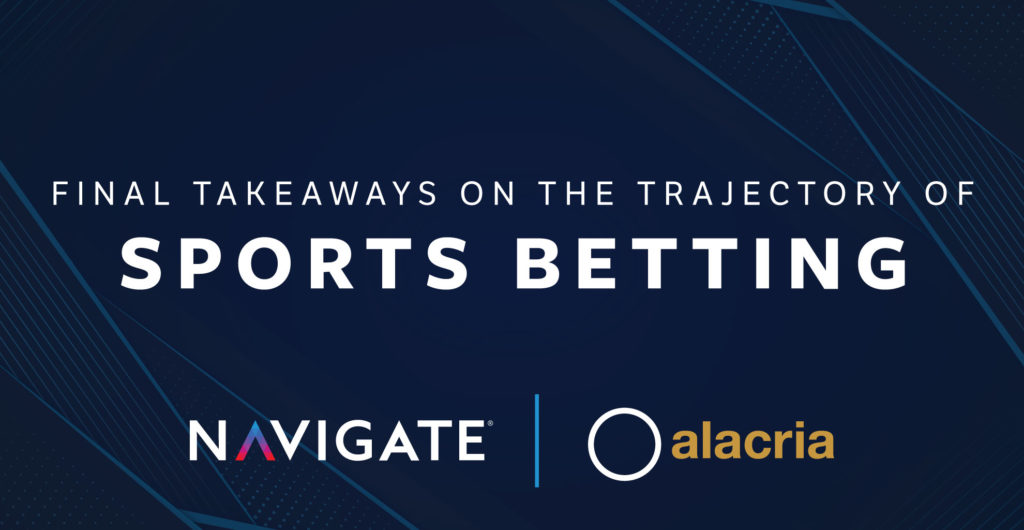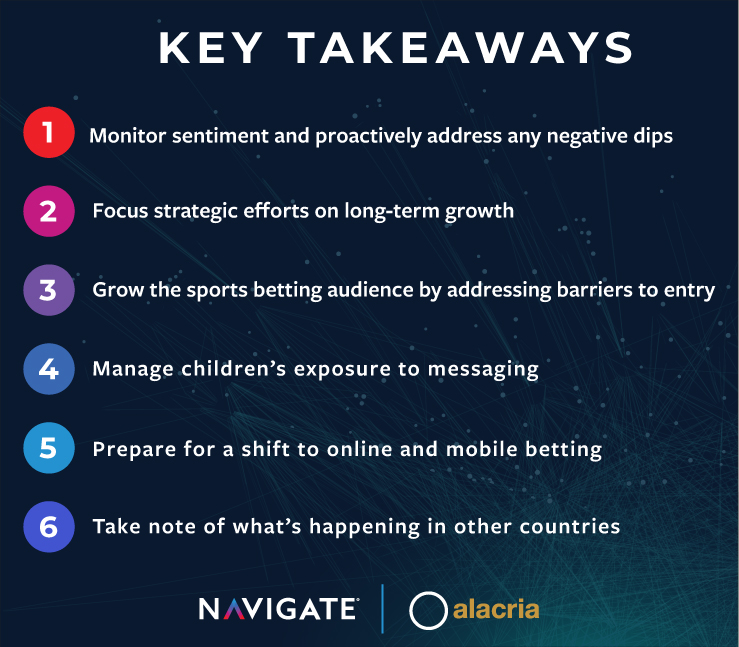As we wrap up our series on sports betting, we’ve highlighted the top takeaways.
Sentiment on Sports Betting
In our study, we found that sentiment around sports betting is largely neutral. Meaning that now is a pivotal time to form and shape sentiment among those who currently feel neutral about sports betting through media, messages, and marketing. As stated in part two of our series, ‘With careful management, positive sentiment may continue to grow because 61% of sports fans agree that they think sports betting will continue to grow in popularity.’ However, this would make the United States the exception to what has been experienced in other markets such as Australia, where sentiment became more negative over time, and that decline in sentiment has led to increased government regulation. Regulation has also been a driver of industry consolidation, with smaller players either exiting or being bought by larger companies because of the increased regulation making their businesses uncompetitive.
Key takeaway:
- It is imperative to continuously monitor sentiment and proactively address any negative dips to ensure sustainable growth.
Sports Betting Advertising
Through our research, observations, and first-hand experience in other overseas markets, we’ve seen a significant increase in sports betting advertisements. For brands and properties, there may be a temptation to proliferate sports betting advertisements across various assets and channels (broadcasts, jersey patches, etc.) to aggressively chase awareness growth and drive customer acquisition. However, in Australia this strategy led to sports fans pushing back on the volume of promotion, particularly messaging that was reaching children, creating the climate for increased regulation. We see the same pattern emerging in the United Kingdom – where there is talk that sports betting apparel branding, including in the Premier League, may be banned because of the over-bearing advertising.1 It’s important for brands and properties in the United States to learn from the experiences of other countries who have already legalized sports betting.
Because advertising is a tactic used to drive acquisition and bet frequency, it’s also important to note how to expedite customer acquisition. Sports bettors’ are like sports fans in that they don’t act rationally, making it more difficult to predict their next move. Understanding fan/consumer attitudes and behaviors will be key for brands to attract new customers more efficiently, as well as increasing bet frequency and value. For rights holders, understanding their fanbase’s interest in, and drivers to, betting will be key to attracting and maximizing their sponsorship opportunity and building longer term, more sustainable partnerships with brands (who will inevitably cut down the number of properties they sponsor over time, as we’ve seen in other markets).
Key takeaway:
- Focus strategic efforts on balancing advertising and promotion to grow bettor numbers, but not overwhelm sports and broadcasts leading to a rapid deterioration in sentiment. Additionally, understanding fan and consumer attitudes will be key for brands and properties to attract new bettors quickly while keeping in mind the importance of long-term sustainable growth and partnerships.
New Sports Bettor Adoption
Despite many drivers to start sports betting, there are significant barriers to overcome before one becomes a sports bettor. In part two of our series, we highlighted the insight that 36% of sports fans fear a risk of financial loss and 27% don’t have the income to spend on sports betting. When taking into consideration all barriers asked about, a noteworthy 60% of sports fans cited financial concerns as a barrier to participating in sports betting. Financial barriers are clearly the top barrier to entry, so brands and properties can pre-emptively capitalize on this knowledge by strategizing how to overcome these barriers.
Key takeaway:
- Strategize how to get sports fans to overcome the top barrier to entry – fear of financial loss. This may take the form of risk-free promotions and incentives, or educational messaging to minimize uncertainty so that bettors can be confident in their bets.
Sports Betting Impact on Children
Recently there have been many efforts to increase participation and interest in professional sports among children to build the fans of the future. For example, the goal of the NFL’s 2021 Nickelodeon broadcast was to attract a new/younger audience that may not otherwise engage with a traditional broadcast. If these strategies work and children stick with the sport (in this case the NFL), they’ll progress to watching non-Nickelodeon broadcasts and thus be exposed to sports betting advertisements. Even children who do not watch NFL broadcasts, it’s highly likely they’ll still be exposed to sports betting advertisements at some point. In part two of our series, we mentioned ‘Despite the growing popularity and relatively positive sentiment towards sports betting, there are still strong concerns. 54% of sports fans agree that children should be shielded from exposure to sports betting.’ With the increased proliferation of advertising and promotions, it is likely that this concern will increase over time.
Key takeaway:
- Management of children’s exposure to messaging is a key part of self-regulation. If precaution isn’t taken, pressure from fans is likely to force sports themselves, or government, to enforce limits on betting advertising within sport.
Mobile vs. Physical Venues
Whilst there was an initial focus in other markets on at-event activations such as betting lounges, branded experiences in stadium, etc., these rights became less attractive to wagering brands relatively quickly. We’ve seen an explosion of onsite locations in stadiums which lead to attracting more investments, but we predict focus and spend will quickly shift to online/mobile after this early aggressive acquisition phase. Data from Bloomberg and SportsHandle.com show that it’s been widely reported that online betting has accounted for between 80-90% of wagers made as the technology has become widely available in legal states. Mobile is cheaper, scalable and allows for much better data which can be gathered and leveraged to drive retention, frequency, inducements etc.
Key takeaway:
- Despite the boom in on-site sportsbooks, we expect a shift to online and mobile betting because of its cost efficiency and data gathering abilities.
Globalization of Sports Betting
Throughout the research, we’ve briefly highlighted what has happened and continues to take place in other countries, especially Australia. Although some countries have legalized sports betting, there remain markets that have not, and it will be interesting to see if and how professional sports in the United States navigate international legalities. The NFL’s recent overseas rights granting is a prime example.2 In many of the markets in which the NFL will be leaving its footprint, sports gambling has yet to be legalized, leading to uncertainty around what the implications may be if in-game branding becomes available – whether it be sports betting brand logos, jersey patches, or other forms of advertising. Professional sports‘ relationships with betting companies in other countries, such as the United Kingdom, Italy, and Spain, look very different today to what they did in the past and continue to evolve. In Spain, for example, sports betting advertisements on TV and radio are to be limited to certain hours of the day, stricter sponsorship regulations have been enacted, and incentive regulations for new players are being enforced.3 Some argue that stricter regulations will give rise to an increase in illegal sports betting, while others argue that stricter regulations are necessary to protect people, especially children. Noting what’s happening in Spain, the NBA has been hesitant to allow its teams to sell jersey patch ads to sports betting companies, citing that they ‘have restrictions because we see what happens internationally’ (NBA’s Senior VP of Fantasy and Gaming, Scott Kaufman-Ross).4
Additionally, we have seen several individual athletes enter into endorsement agreements with sports books, particularly in golf. As a result, many international sports federations, such as FIFA, have banned athletes, coaches, officials, and even administrators from having personal associations with sports betting entities. This area is likely to evolve in the U.S. and will particularly be the case if instances of spot or match fixing emerge.
Because sports gambling in the United States is still immature, some professional leagues and athletes have capitalized on legalization, while others have been hesitant from observing what’s happening internationally.
Key takeaway:
- Take note of what’s happening in other countries by learning the pros and cons of strict versus loose regulation and how taking a stance on one or the other may impact your brand or property.
Given how quickly sports betting in the United States is evolving, we’ll continue to monitor the space and provide additional insights in our next wave of research.
What questions do you have about our study, or what would you like to learn more about? Submit them HERE and we will publish answers shortly.
If you have any questions or would like to discuss the full report with our team, please contact Luke Bould at [email protected]
*Insights / legal states were as of October 2021 when the study was fielded



